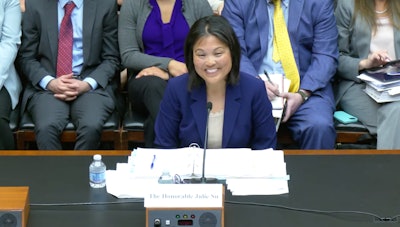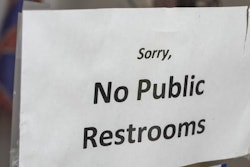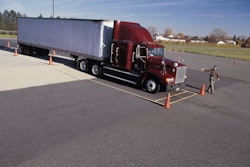
Julie Su, President Joe Biden's nominee to lead the Department of Labor (DOL), faced the House Education and Workforce Committee Wednesday – an appearance that was called to defend her department's budget request for fiscal year 2024 and testify on the department’s policies and priorities, yet became a heated discussion of her pending confirmation and laid bare the political battle lines holding it up.
Su has served as DOL Acting Secretary since March and was nominated in February by President Joe Biden to assume the role of Secretary. In his nomination of Su in February, Biden called Su "a tested and experienced leader, who will continue to build a stronger, more resilient, and more inclusive economy that provides Americans a fair return for their work and an equal chance to get ahead."
Su's nomination remains stalled in the Senate, where she presumably doesn't have enough votes for confirmation. Wednesday's hearing in the House wasn't a step toward Su's potential confirmation but became a showcase of an ongoing partisan fight with House Republicans chastising Su's leadership of a department that they see as too big and lacking accountability and Democrats singing her praises for overseeing a period of record-low unemployment.

AB 5 is an obstacle
Su's nomination has been met with resistance from the trucking industry, with American Trucking Associations (ATA), Owner-Operator Independent Drivers Association (OOIDA) and Truckload Carriers Association (TCA) each voicing concern over the role Su played as Secretary of the California Labor and Workforce Development Agency in passing California's AB 5 independent contractor legislation – "the most disruptive worker classification policy to be enacted anywhere at the state or federal level," OOIDA President & CEO Todd Spencer wrote in a letter to senators Bernie Sanders and Bill Cassidy in March.
Under pointed questioning from Rep. Kevin Kiley (R-California) Wednesday, Su said she was not involved in the drafting of AB 5 but declined to answer whether she thought AB 5 is a good law. Rather, Su defended her position on AB 5 as an obligation to enforce a rule enacted by the state legislature, regardless of what she thought of it personally.
While it's been legally challenged numerous times by many trucking industry stakeholders, including the California Trucking Association, AB 5 essentially classifies owner-operators leased on with a carrier in the state as employees of that carrier. Under questioning by Rep. Lisa McClain Wednesday, Su said she would not demand that Congress pass a similar bill if appointed Secretary.
"AB 5 is not federal law. It would only be federal law if Congress decides that it should be," she said. "I have not called for that at the federal level. In fact, I have explicitly, during my tenure as Deputy Secretary of Labor, when we created the proposed rule about independent contractors, I explicitly said we do not adopt an ABC test and in fact we cannot adopt an ABC test ... Bonafide independent contractors will always have a place in our economy."
Proposed rulemaking published by the Department of Labor’s Wage and Hour Division in October 2022 proposes that the DOL revise its own guidance in determining who is an employee or independent contractor under the Fair Labor Standards Act (FLSA), and while it applies a six-factor economic realities test rather than the ABC test like California to determine who is and who is not an employee, transportation stakeholders believe such rulemaking could have a potentially similar effect as California’s AB 5.
"Ms. Su already has significant authority over that rulemaking in her current position as Deputy Secretary of Labor and would have nearly complete authority to author a final rule if confirmed as Secretary," ATA President and CEO Chris Spear wrote in a letter to Senate leadership earlier this month.
Registered apprenticeships and job growth
Chairwoman Virginia Foxx (R-N.C.), who chided the Biden administration for reversing many Trump administration labor policies and amassing "a troubling record of big labor bias... [and] a culture of union favoritism that undermines laborer's rights," expressed her concern over DOL's favor of registered apprentice programs versus unregulated employer-sponsored programs in attracting would-be workers into blue collar jobs.
"It's hard to think of a worse response to a worker shortage," she said, adding the graduation rate from registered apprenticeship programs is 43%.
Rep. Donald Norcross (D-New Jersey), himself a product of a registered apprentice program in the construction industry, shrugged off the idea that registered training programs were somehow a governmental overreach, noting "there is nothing preventing any company from creating their own apprenticeship program...They're allowed at any moment to create it. There is no stopping it. You can do it yourself – unless you want the government to pay you to do it. That's the big difference. 'We want your money but we don't want any kind of regulations.'"
Su said in a three month-period, her department worked with more than 700 employers on trucking industry apprenticeships alone, adding the majority of apprenticeships supported by her department have been through non-union employers, and that DOL has actually expedited the development and implementation of apprenticeship programs.
"It used to takes months for an employer who wanted to do one, to do one," she said. "It's now a matter of days."
Since January 2021, 584,000 new apprenticeships have been created. "In 2023 so far, 90,698 new apprenticeships created," added Rep. Pramila Jayapal (D-Washington).










